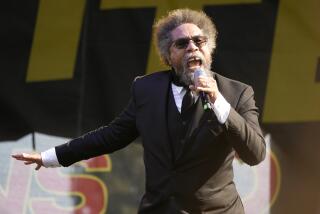Newt Gingrich playing catch-up to new front-runner status
Reporting from Des Moines â With voting in the Republican presidential contest only a month away, Newt Gingrichâs campaign was surging this week. But in his office in suburban Des Moines, something was missing.
There were no workers, no phones. As of Thursday, when Gingrich spoke at a nearby hotel, the office lights had not been turned on.
The disconnect was a telling example of the challenges he faces in turning his recently revived yet still disorganized candidacy into one capable of corralling the nomination. Heâs scrambling to hire staff, open campaign offices and reach out to undecided voters â against a rival, Mitt Romney, who has had five years to build a nationwide organization.
âAre we behind the ball? Yeah, we know it,â said R.C. Hammond, a Gingrich spokesman.
The unglamorous side of politics â everything from getting the candidateâs name on ballots to developing the organizational effort known as the ground game to conveying an unending stream of reassurance to supporters â can make the difference between winning or losing an election.
All of that takes time and especially money, which Gingrich has only recently begun to attract.
Adopting a strategy more common to long shots than the front-runner he has become, Gingrich is attempting to yoke his campaign to existing networks. In the first two primary states, New Hampshire and South Carolina, he has invested heavily in the tea party movement, giving its leaders key campaign jobs and attempting to harness its energy to his candidacy.
Since September, Hammond said, the campaign has reached out to voters in early states from a calling center in Georgia. Around the country, volunteers have taken responsibility for placing Gingrichâs name on the ballot, he added.
Difficulties are already evident. Several states, including Virginia, Illinois, New Jersey, Alabama, Rhode Island and Vermont, have particularly onerous ballot requirements, sometimes requiring thousands of signatures from throughout the state, an expensive effort.
Last week, Gingrich was the only major GOP presidential contender who failed to get on the ballot for Missouriâs Feb. 7 primary. The election is nonbinding and delegates will be chosen through caucuses that begin in March. But missing the chance to compete could make it more difficult for Gingrich to sustain momentum if he does well in early contests, since Missouri is the only primary in the long stretch between Jan. 31 and Feb. 28.
Gingrich, who says he has received at least $4 million since the end of September, opted not to send a $1,000 check to the Missouri Republican Party to place his name on the ballot. It was a money-saving decision, Hammond said.
âThatâs enough money to send two people to Des Moines,â he said.
Within the last few weeks, as donations began flowing, Gingrich hired at least 22 staffers in Iowa, New Hampshire and South Carolina, a total thatâs comparable to Romneyâs paid staff in those early-voting states. The campaign counts on bolstering their efforts via social media and the Internet.
The first and perhaps most important test for Gingrich will be Iowa, which opens the Republican nomination season on Jan. 3. A victory in the stateâs caucuses could position him as the main alternative to Romney.
âIf thereâs a blizzard on caucus night, organization matters immensely, because the best-organized campaigns are going to turn out their supporters,â said Tim Albrecht, an advisor to Republican Gov. Terry Branstad, who is neutral in the race.
At each of close to 2,000 precincts across the state, representatives of the campaigns are given the opportunity to woo undecided voters by delivering short speeches â assuming the campaign is organized enough to send someone in the first place.
Not being organized âwill cost you some votes. It doesnât mean you canât win, place or show,â said Steve Grubbs, a veteran campaign organizer in Iowa who is working for Herman Cain. âAt the end of the day, you still have to convince 25,000 or 30,000 people to head out on a subfreezing January night to spend two hours with a lot of people they probably donât know.â
Gingrich supporter Darrell Kearney of Des Moines, a caucus veteran going back to Ronald Reaganâs presidential campaigns in the 1980s, acknowledges that âitâs a handicap when youâre starting this late, but it can be overcome.â
Four years ago, thinly financed, loosely organized Mike Huckabee defeated Mitt Romneyâs extensive campaign operation in Iowa when the stateâs potent evangelical bloc coalesced around the former Baptist minister. But this year they have divided their support among several Romney rivals.
Even without a sophisticated operation to get people to the caucuses, Gingrich â or some other candidate who gets hot over the next few weeks â could be the beneficiary of an expected surge of participation by tea party sympathizers and other first-time voters who are likely to show up on their own.
âOrganizations arenât there,â Albrecht said. âBut the drive to attend the caucuses is.â
More to Read
Sign up for Essential California
The most important California stories and recommendations in your inbox every morning.
You may occasionally receive promotional content from the Los Angeles Times.










